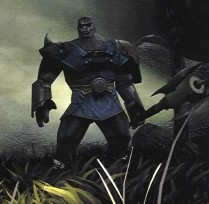Lugian: Difference between revisions
imported>Tlosk No edit summary |
imported>Tlosk (→Stats) |
||
| Line 295: | Line 295: | ||
|- | |- | ||
|[[Lithos Lugian]] | |[[Lithos Lugian]] | ||
|align=center| | |align=center| 35 | ||
|align=right| | |align=right| 4000 | ||
|align=center| | |align=center| 140 | ||
|align=center| | |align=center| 330 | ||
|align=center| | |align=center| 90 | ||
|align=center| | |align=center| 2 | ||
| | | ?? | ||
|- | |- | ||
|[[Lithos Raider]] | |[[Lithos Raider]] | ||
Revision as of 17:37, 24 March 2008
See also Category:Lugian.
AC:DM Bestiary Description

Lugians, a race of massive gray giants, were among the first arrivals on Dereth. They are incredibly massive and strong – the average Lugian is eight feet tall and weighs half a ton.
They live, for the most part, in the Linvak Mountains in the south of Osteth, where their fortress of Linvak Tukal was built. (This translates as “Great Tukal” – Tukal being a city on their homeworld equal in size and importance to Ispar’s Tirethas, Roulea, or Celdon.) They are determined, single-minded fighters, and their massive fists can crush a common human with a single blow.
Lugians are in love with the earth and works of artifice. They have never been seen to use magic, and discovered and developed chorizite, the magically inert ore that is forged into mage-killing “hollow” weapons. As Linvak Tukal proves, they are superlative engineers and inventors, with a preference for simple, rugged construction.
Lugian society on Dereth is clannish and structured, employing a rigid caste system and a strict code of honor to enforce order among their ranks. Their five castes, from lowest to highest, are Laigus (commoner), Amploth (artisan), Obeloth (fighter), Lithos (champion), Gigas (governor), Extas (patriarch or matriarch), and Tiatus (smith). Lugians are severe isolationists: intruders in their steadings are slain swiftly and without mercy.
The Lugian homeworld is called Tuu, after one of their gods (“god of rocks and things that sit around” in one translation). It is a cold and mountainous world with no moons to grace the night. Instead, “The Forge of Heaven,” a massive nebula that fills one-third of the sky, serves as a source of illumination after sunset.